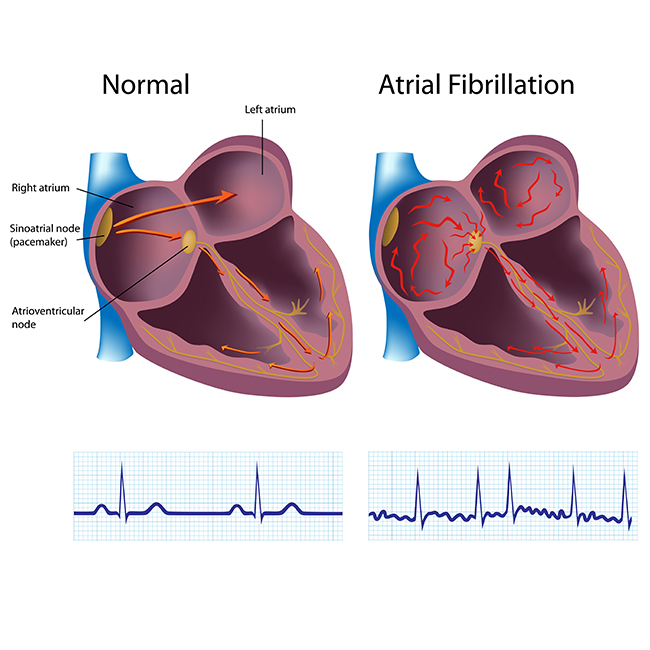Atrial Fibrillation : A Common Treatable Condition

Introduction
Atrial fibrillation (AFib or AF) is when your heart’s upper chambers (Atria) beat irregularly and out of sync. The heart’s pumping function isn’t as strong or efficient as it should be because the atria aren’t squeezing in rhythm as they should be. This can cause an increased risk of stroke or reduce the pumping efficiency of the heart. Fortunately, with treatment, you can prevent stroke and live longer.
Anyone can develop atrial fibrillation. The risk of AF increases with age, especially after age 65. But it also affects younger people who have had heart failure or other underlying conditions like diabetes or high blood pressure. People who smoke are more likely to develop AFib than non-smokers. High blood Pressure is another risk factor for developing the condition. Diabetes can also be a contributor because the disease often leads to heart problems like valve damage or increased stiffness of heart muscles. which could lead to atrial fibrillation.
AFib Symptoms Can Be Mild or Severe
Atrial fibrillation symptoms can be mild or severe, which include, but are not limited to:
- Palpitations (a sensation of fluttering in the chest)
- Fatigue
- Dizziness
- Shortness of breath
There Are Three Types of Treatment For AFib
There are three types of treatment for atrial fibrillation.
- Medications: The most common medications include beta-blockers, calcium channel blockers, and anticoagulants. These drugs are used to keep your heart rhythm steady and treat the symptoms of AFib.
- Catheter Ablation: In this procedure, a thin tube called a catheter is inserted into either arm or groin area where an electric current is delivered directly into abnormal tissue triggering heart muscle contraction so that electrical waves are not able to form again
- Surgery: If medications don’t control your symptoms, surgery may be an option. However, it’s only performed as a part of another surgery – usually a valve replacement surgery. In this procedure criss-cross incisions are made in the atria wall so that there are no abnormal electric circuits that are persistent.. There are two types of surgery options: one is done on the surface of the heart (called ablation) with another that goes through open chest surgery (called surgery).
If you’re living with atrial fibrillation, there are several medications that can help keep your heart rate regular and reduce your risk of stroke.
- Anticoagulants can reduce the risk of blood clots forming in your heart or elsewhere in the body.
- Beta-blockers lower heart rate and blood pressure, making it easier for your body to pump blood. They may also help relieve chest pain and dizziness caused by irregular heartbeat (known as palpitations).
- Calcium channel blockers can improve blood flow through narrowed arteries by affecting the way calcium travels through them, reducing the stress on the heart muscles.
Conclusion
If you’ve been diagnosed with atrial fibrillation, don’t panic. It is a treatable condition, and the right treatment can make it almost as easy to manage as other common conditions like hypertension or diabetes. If you feel like something might be wrong with your heart and want to know more about AFib treatment options, talk to your doctor or go see a cardiologist today.

